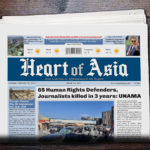United Nations mission in Afghanistan in a report recorded a total of 65 Humans rights defenders and media professionals killed since January 2018 until January 2021, 32 individuals were killed from human rights sector and 33 were killed from the media sectors.
UNAMA reported on Monday that 11 Human rights defenders and media workers have died in different attacks since the start of peace negotiations from September 2020 to January 2021.
“The killings have had the broader impact across society of also diminishing expectations around efforts towards peace,” UNAMA statement read.
Media space and human rights with many professionals have started exercising self-censorship in their works and duties, or they have quit their job or left their homes and country for the hopes of safety.
Many journalists and high-profile personalities fled the country, and that the killings had a broader impact on the society of reporters and human rights defenders.
Deborah Lyons, head of UNAMA in Afghanistan said “The Afghan people need and deserve a flourishing civic space – a society where people can think, write and voice their views openly, without fear,”
“The voices of human rights defenders and the media are critical for any open and decent society. At a time when dialogue and an end to the conflict through talks and political settlement should be the focus, the voices from human rights and the media need to be heard more than ever before, instead, they are being silenced,” she added.
According to the report Journalists and Human rights defenders work on a range of issues including violations of international humanitarian law and human rights law, for their work they get exposed to threats, harassment, intimidation, arbitrary detention, and surveillance.UNAMA report indicated that all actors play an important role in preventing such attacks and intimidation, preventing impunity, and promoting accountability, the report also added that the investigations should be independent, thorough, effective, impartial, prompt, credible, and most importantly transparent, the report added.
Prosecution of suspected perpetrators should strictly follow fair trial standards, the report suggested, adding that the use of charged rhetoric against the role of civil society and the media, threats against whistleblowers, and target list circulation contributes to perpetuating conditions to further shrink civic space and put an unsettling effect on the population, human rights defenders and the media.
UNAMA called on all of the insurgent groups including the Taliban to stop killing journalists, human rights defenders, and civil society activists.
Particularly the United Nations Assistance Mission in Afghanistan called on the Taliban to condemn such attacks at their leadership level,
UNAMA demanded the Taliban to investigate cases where Taliban members are alleged to have been involved and whether they are accountable for order and implementing such killings of human rights defenders, journalists, and media workers.
The group was also encouraged to adopt, publicize and enforce policies that prohibit the killings of human rights defenders, journalists, and media workers and to repeal existing policies (and refrain from adopting new ones) limiting civic space, including restrictions to freedom of association, the work of civil society and humanitarian actors, and freedom of expression.
UNAMA asked the Taliban to publicize any policies that prohibit the killings of human rights defenders, journalists, civil society activists, and media workers and repeal existing police and refrain from adopting new ones that limited civic space and imposed restrictions on freedom of association, freedom of speech, freedom of expression and narrows duties for society and humanitarian actors.
The international community was also called on for assistance by condemning the killings of human rights defenders and media workers and called on them to put the importance of their roles on the table.
UNAMA called on the international community to further increase supports to the programs that allow Afghan journalists, human rights defenders, and media workers privileges in the fields of travel, security, finance, capacity building, and other areas, the organization called for prolonged and increased assistance to such sectors of the Afghan society.












